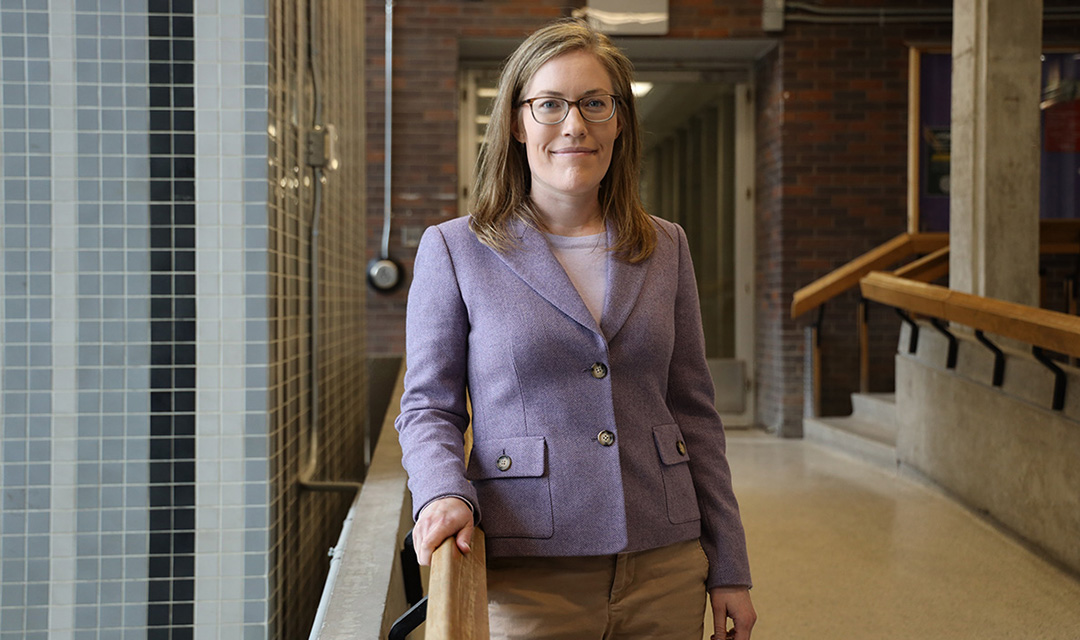Alum spotlight: Kristen Schell
Sarah Lindley
Jul 25, 2025

Source: Kristen Schell
Transitioning to sustainable energy is crucial, but when determining which technologies to deploy—and when and where to do so—there are many variables to consider. Renewable energy sources are intermittent. To rely more on renewables, we will need new methods to optimally forecast their uncertainty and to figure out how to use that uncertainty more efficiently.
That's the type of problem Kristen Schell ('07) has been tackling ever since graduating from Carnegie Mellon with majors in chemical engineering and engineering and public policy.
As an associate professor at Carleton University in Ottawa, where she holds a prestigious Canada Research Chair, Schell develops large-scale energy system models that integrate uncertainty.
"Every model we build is designed to figure out how to make the most efficient use of the system, so we can get to an energy system that's affordable and reliable," says Schell.
She builds models for wind—for which she won a methodological award and holds a patent—and hydropower.
"For wind, it's a lot of atmospheric microscale modeling: pressure, humidity, wind speed," says Schell. "We're building on the fluid dynamics of numerical weather prediction models (the same ones that give you the weather forecast on your phone), and we train and develop deep learning models that can incorporate information in ways that our fundamental physical equations can't."
Engineers are problem solvers. What we do is solve challenging problems. And that’s a fantastic skill to have.
Kristen Schell, Associate Professor and Canada Research Chair, Carleton University
Schell's interest in energy modeling began during her undergraduate years at Carnegie Mellon. She was excited by the challenge of rigorous coursework, and found balance through extracurricular groups like Dancers' Symposium and Society for Women Engineers; she even co-founded a chapter of Engineers for a Sustainable World with fellow alum Marita Zimmermann ('07).
Schell remembers the chemical engineering culture fondly, recalling friends she still keeps in touch with, gender diversity among the students, and humanizing moments that helped her connect with professors, like Ignacio Grossmann and Erik Ydstie.
"We had a really funny experience with Professor Paul Sides when he was teaching us fluid dynamics. I still remember the quote to this day. He was deriving a difficult equation, and someone asked a question on it, and his answer was, 'You do not want to see how the sausage is made,'" says Schell. "It made everybody laugh. Our cohort ended up making T-shirts because it was so funny. I still have that T-shirt."
Yet it was not faculty, but a few chemical engineering teaching assistants that helped Schell realize her career goals. In a project course, the TAs demonstrated how dispersion of pollutants in the atmosphere could be quantified back to their sources through modeling.
"We were looking at one particular oil refinery in Texas and modeling how their emissions were impacting asthma and other comorbidities in Atlanta," Schell says. "That was the first time I realized what a big impact what we were doing could have."
After graduating, Schell accepted a consulting position conducting greenhouse gas inventories in Washington, D.C., but felt like she wasn't getting challenged the way she did at Carnegie Mellon. She completed a master's degree at Johns Hopkins University, and then earned her Ph.D. through Carnegie Mellon's dual degree program, splitting her time back in Pittsburgh and at the University of Porto in Portugal.
Today, Schell researches the economic and political challenges associated with implementing energy transition strategies. She and fellow engineering and public policy Ph.D. alum Ahmed Abdulla are co-founders of the Alternative Pathways for the Energy Transition (APEX) research group at Carleton University.
Schell also teaches courses for both undergraduate and graduate sustainable energy programs. Inspired by her education at Carnegie Mellon, she strives to incorporate real-world examples into the curriculum, so the students can see the tangible potential impacts of engineering.
"Engineers are problem solvers. What we do is solve challenging problems. And that's a fantastic skill to have."
